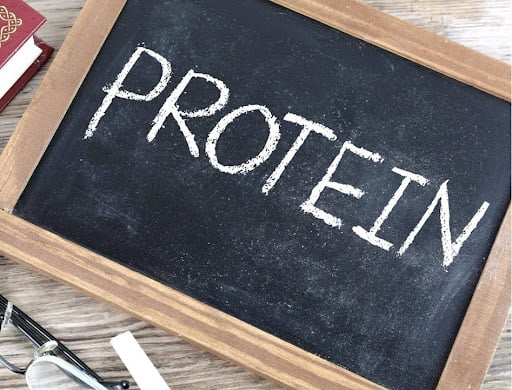Learn more on protein powder for shakes, what it can do for your body, how much you should consume in a day, and more. Bodybuilders and athletes are not the only ones in need of protein, so let’s take a look at the best ways to utilize this essential nutrient.
What is protein powder?
Protein is an essential nutrient that everyone needs. Some include it in their everyday diet with whole foods, some incorporate it from supplements, and some are fans of both. The most common arguments in support of protein powder are the way it improves your body composition and its convenience for those always on the go. But what is protein powder really made of?

To put it simply, protein comes in multiple forms. One of those forms is protein powder – a powdered version of protein that is derived from plants, eggs, and milk. Specifically, most powders are made out of peas, rice, soybeans, potatoes, casein, or whey. Just like most food or dietary supplements, protein powders can contain other additional components such as vitamins, artificial flavoring, added sugar, thickeners, and minerals.
What does protein powder do for your body?
Protein is defined as a macronutrient that everybody needs to fuel their body. It produces enzymes and hormones for your body and assists in building muscle and repairing tissues. People find protein powder advantageous in numerous ways, and people are able to utilize it in a way that caters to their needs.
First, it is an extremely common nutritional supplement that helps with muscle toning, weight loss, and the development of strong bones and good skin. Here are a few reasons protein powder enthusiasts choose to use this supplement:
- Exercise recovery
- Dietary needs for weight loss/management
- Additional nutrition
- Growing muscles/muscle mass
Exercise Recovery
We can all relate to the feeling of sore muscles after a good workout. Avid workout-goers, bodybuilders, and athletes typically use protein powder as a way to help their muscles recover after weight lifting or a tough workout. The protein in protein powders is able to speed up your muscle’s recovery time so you don’t feel as sore for as long. Studies have shown three main advantages of ingesting protein powder after exercise: improves protein muscle synthesis, increases muscle performance, and minimizes the damage on muscles.

Dietary Needs for Weight Loss and/or Weight Management
Many people go on diets when they’re trying to lose weight. One of the best ways to lose weight is through portion control with food. Most find it difficult to curb their hunger when they’re eating smaller portions during meals and cutting snacking throughout the day. A smart way to stay full for longer periods of time is by consuming protein supplements, which is why this is such a popular method when trying to shed a few pounds.
Protein powder, whey powder specifically, has the ability to decrease your body’s total fat mass and body weight. Past studies have also shared that it’s possible for whey protein to reduce your body’s total cholesterol, blood pressure, and other contributors to cardiovascular diseases.
Additional Nutrition
If you’re a vegan or vegetarian, then it’s very important for you to find foods or supplements with high amounts of protein that replace the protein found in meats and eggs. A common and easy solution most people find is introducing protein powder into their diet.
Growing Muscles and/or Muscle Mass
Protein acts as fuel for both men’s and women’s muscle building because it aids in strength training and/or bulking. If you frequently lift weights or participate in resistance exercise routines, studies show that adding protein supplements to your diet is quite effective in improving muscle strength and size.
How much protein should you have in a day?

The amount of protein your body needs every day depends on your age and sometimes your weight. WebMD states that:
- Adult women: Need ~46g of protein per day (~71g while pregnant and/or breastfeeding)
- Adult men: Need ~56g of protein per day
- Adolescent girls: Need ~46g of protein per day
- Adolescent boys: Need up to ~52g of protein per day
- Children in school: Need anywhere from 19-34g of protein per day
- Babies: Need ~10 grams of protein per day
Now we have a better understanding of what protein powder consists of, what it can do for our bodies, and how much is needed for both men and women on a daily basis. Let’s dive into other areas of protein shakes, shake recipes, and workouts for people who like to supplement with protein powder.
How many protein shakes a day?
Protein is an essential nutrient for everyone, however, overconsumption of protein can actually be quite harmful to the body. It’s important to know the daily doses of protein for your particular age, size, and gender.
One shake that includes one scoop of protein powder is a good rule of thumb when figuring out how many protein shakes you should have a day. To break it down a bit more, a single scoop of protein powder typically measures out to be 25 grams of protein.
Refer back to the bullets above. You’ll notice that one shake with one scoop of powder already fulfills approximately half of a person’s daily protein intake.
Consuming more than this can negatively affect your body, including:
- Digestive Problems – people who consume too much protein will most likely experience increased nausea, bowel movements, and bloating. Be aware that whey and casein powders originate from milk, so if you over-consume and are lactose intolerant, you’ll encounter a very upset stomach.
- Hormone Changes – Your endocrine system can greatly fluctuate from too much soy-based protein powder. This kind of powder is rich in phytoestrogen, and when phytoestrogen is ingested, it imitates the estrogen hormone.
- Weight Gain – Weight gain from protein powder pretty much defeats the point, doesn’t it? Excessive amounts of protein powder can actually have the reverse effects on your body and make it fattier. Your workouts are most likely not burning enough calories in relation to how much protein you’re consuming, and those unburned calories turn to fat.
- Kidney Issues – High intake of protein translates to high amounts of urea in the body. The kidney functions as a filter for urea, meaning higher amounts of it increase the pressure put on your kidneys.
- Metal Poisoning – This is a possible side effect of protein powder. Reports from consumers indicate that some of these protein powders are infused with arsenic and lead. Both are harmful to the body, but even more so when you’re ingesting too much protein.
- Dehydration – Dieting with high amounts of protein can lead to dehydration. Water is the most important thing for your body, so be sure to drink plenty of water when supplementing with protein.
These are examples of just a few side effects the body can experience from too much protein powder.
How to make a protein shake?

Step 1: Pick your base – ice or frozen fruit? I prefer frozen fruit to get additional flavor and nutrients.
Step 2: Pick the best protein powder and/or other protein sources. Add one scoop of protein powder and then decide whether or not you want to add peanut butter, chia seeds, or flax seeds for more protein.
Step 3: If your protein powder isn’t flavorful or you opted into ice in the first step, then you may want to add some kind of sweetener. Honey is always a good choice for this step.
Step 4: Add your liquid. Almond milk, oat milk, low-sugar juice, or water are all good options to help blend everything together. Start with about ½ of a cup of the liquid of your choice and then add more as needed.
Step 5: Time to blend your ingredients together with the best blender you can find! If your shake seems too thick, now is a good time to add more of your favorite liquid.
Final Thoughts
Protein powder is a great supplement for your body if you understand the risks and benefits that come along with its use. If your current diet is in need of protein, then supplementing with powder is a great option to fill those nutritional gaps. If you’re looking to gain strength, protein powder can be used as a great tool to meet those goals.
However, abusing protein powder by consuming it in excessive amounts can be extremely harmful to your body and result in reverse effects of what you were working toward. Research as much as you can before transitioning your diet and including protein powder in your everyday life.
Sources:
https://www.piedmont.org/living-better/why-is-protein-important-in-your-diet
https://www.articleinsider.com/protein
https://www.muscleandfitness.com/workouts/workout-tips/top-10-muscle-and-strength-building-moves/
https://www.livestrong.com/article/471063-problems-digesting-protein-powder/









